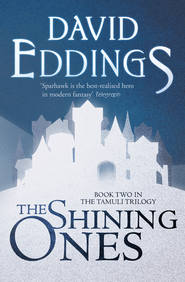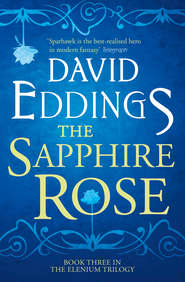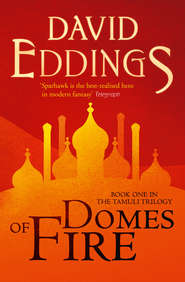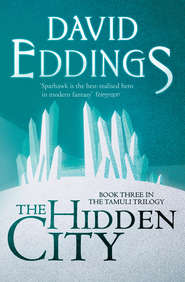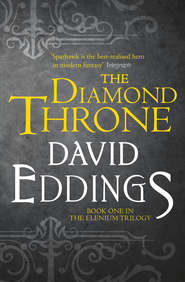По всем вопросам обращайтесь на: info@litportal.ru
(©) 2003-2025.
✖
Belgarath the Sorcerer
Автор
Год написания книги
2019
Настройки чтения
Размер шрифта
Высота строк
Поля
Belzedar worked at least as hard as the rest of us. He seemed obsessed with the Orb, and his labor on means to reclaim it was filled with a kind of desperate frenzy. Through it all, Belsambar sat, patiently waiting. He seemed to know that once the fighting started, we’d return to his hideous solution.
In addition to our own labors, we frequently traveled to the lands of our allies to see what progress they were making. Always before, the various cultures had been rather loose-knit, with no single individual ruling any of the five proto-nations. The war with Torak changed all that. Military organization is of necessity pyramidal, and the concept of one leader commanding an entire race carried over into the various societies after the war was over. In a way, I suppose you could give Torak credit – or blame – for the idea of kings.
I suppose that I’m the one who was ultimately responsible for the royal house of the Alorns. By general consensus, my brothers and I had continued to serve as liaisons between the various races, and we more or less automatically assumed responsibility for the people of whichever God we had personally invited to that conference in the Vale after Torak stole the Orb. I think that my entire life has been shaped by the fact that I had the misfortune to be saddled with the Alorns.
Our preparations for war took several years. The assorted histories of the period tend to gloss over that fact. There were border clashes with the Angaraks, of course, but no really significant battles. Finally the Gods decided that their people were ready – if anybody in those days could actually be called ready for war. The war against the Angaraks was like no other war in human history in that our deployment involved a general migration of the various races. The Gods were so intimately involved with their people in those days that the notion of leaving the women and children and old people behind while the men went off to fight simply didn’t occur to them.
Mara and Issa took their Marags and Nyissans and started their trek southeasterly into the lands of the Dals, even as the Tolnedrans and Arends began their swing toward the west. The Alorns, however, didn’t move. It was perhaps the only time I ever saw my Master truly vexed about anything. He instructed me with uncharacteristic bluntness to go north and find out what was holding them up.
So I went north again, and, as always by now, I didn’t go alone. I don’t know that we’d ever actually discussed it, but the young she-wolf had sort of expropriated me. Since she was along, I once again chose the shape of a wolf for the journey. She approved of that, I suppose. She was never totally satisfied with my real form, and she seemed much happier with me when I had four feet and a tail.
We found out what was holding up the Alorns almost before we reached the lands of the Bear-God. Would you believe that they were already fighting – with each other?
Alorn society – such as it was in those days – was clannish, and the bickering was over which clan-chief was going to take command of the entire army. The other Gods had encountered similar problems and had simply overruled the urges toward supremacy of the various factions and selected one leader to run things. Belar, however, wouldn’t do that. ‘I’m sure you can see my position, Belgarath,’ he said to me, when I finally found him. He said it just a little defensively, I thought.
I took a very deep breath, suppressing my urge to scream at him. ‘No, my Lord,’ I said in as mild a tone as I could manage. ‘Actually, I don’t.’
‘If I select one clan-chief over the others, it might be construed as favoritism, don’t you see? They’re simply going to have to settle it for themselves.’
‘The other races are already on the march, my Lord,’ I reminded him as patiently as I could.
‘We’ll be along, Belgarath,’ he assured me, ‘eventually.’
By then I knew Alorns well enough to realize that Belar’s ‘eventually’ would quite probably stretch out for several centuries.
The she-wolf at my side dropped to her haunches with her tongue lolling out. Her laughter didn’t improve my temper very much, I’ll confess.
‘Would you be open to a suggestion, my Lord?’ I asked the Bear-God in a civil tone.
‘Why, certainly, Belgarath,’ he replied. ‘To be honest with you, I’ve been racking my brains searching for a solution to this problem. I’d hate to disappoint my brothers, and I really don’t want to miss the war entirely.’
‘It wouldn’t be the same without you, my Lord,’ I assured him. ‘Now, as for your problem. Why don’t you just call all your clan-chiefs together and have them draw lots to decide which of them will be the leader of the Alorns?’
‘You mean just leave it all in the hands of pure chance?’
‘It is a solution, my Lord, and if you and I both promise not to tamper in any way, your clan-chiefs won’t have any cause for complaint, will they? They’ll all have an equal chance at the position, and if you order them to abide by the way the lot falls, it should put an end to all this …’ I choked back the word ‘foolishness.’
‘My people do like to gamble,’ he conceded. ‘Did you know that we invented dice?’
‘No,’ I said blandly. ‘I didn’t know that.’ To my own certain knowledge, every other race made exactly the same claim. ‘Why don’t we summon your clan-chiefs, my Lord? You can explain the contest – and the rules – to them, and we can get on with it. We certainly wouldn’t want to keep Torak waiting, would we? He’ll miss you terribly if you’re not there when the fighting starts.’
He grinned at me. As I’ve said before, Belar has his faults, but he was a likeable young God. ‘Oh, by the way, my Lord,’ I added, trying to make it sound like an afterthought, ‘if it’s all right with you, I’ll march south with your people.’ Somebody had to keep an eye on the Alorns.
‘Certainly, Belgarath,’ he replied. ‘Glad to have you.’
And so the Alorn clan-chiefs drew lots, and regardless of what Polgara may think, I did not tamper with the outcome. In my view, one clan-chief was almost the same as any other, and I really didn’t care who won – just as long as somebody did. As luck had it, the clan-chief who won was Chaggat, the ultimate great-grandfather of Cherek Bear-shoulders, the greatest king the Alorns have ever had. Isn’t it odd how those things turn out? I’ve since discovered that while I didn’t tamper and neither did Belar, something else did. The talkative friend Garion carries around in his head took a hand in the game. He was the one who selected Cherek’s ancestor to be the first King of the Alorns. But I’m getting ahead of myself – or had you noticed that?
Once the question of leadership had been settled, the Alorns started moving in a surprisingly short period of time – although it’s not all that surprising, if you stop and think about it. The Alorns of that era were semi-nomadic in the first place, so they were always ready to move on – largely, I think, because of their deep-seated aversion to orderliness. Prehistoric Alorns kept messy camps, and they found the idea of moving on to be far more appealing than the prospect of tidying up.
Anyway, we marched south, passing through the now-deserted lands of the Arends and the Tolnedrans. It was about midsummer when we reached the country formerly occupied by the Nyissans. We began to exercise a certain amount of caution at that point. We were getting fairly close to the northern frontier of the Angaraks, and it wasn’t very long before we began to encounter small, roving bands of the Children of Torak.
Alorns have their faults – lots of them – but they are good in a fight. It was there on the Angarak border that I first saw an Alorn berserker. He was a huge fellow with a bright red beard, as I recall. I’ve always meant to find out if he might have been a distant ancestor of Barak, Earl of Trellheim. He looked a lot like Barak, so there probably was some connection. At any rate, he outran his fellows and fell single-handedly on a group of about a dozen Angaraks. I considered the odds against him and started to look around for a suitable grave-site. As it turned out, however, it was the Angaraks who needed burying after he finished with them. Shrieking with maniacal laughter and actually frothing at the mouth, he annihilated the whole group. He even chased down and butchered the two or three who tried to run away. The children of the Bear-God, of course, stood there and cheered.
Alorns!
The frothing at the mouth definitely concerned my companion, though. It took me quite some time to persuade her that the red-bearded berserker wasn’t really rabid. Wolves, quite naturally, try to avoid rabid creatures, and my little friend was right on the verge of washing her paws of the lot of us.
Our encounters with the Children of the Dragon-God grew more frequent as we drew nearer and nearer to the High Places of Korim, which at that time was the center of Angarak power and population. We managed to obliterate a fair number of walled Angarak towns on our way south, and the reports filtering in from our flanks indicated that the other races involved in our assault on Torak’s people were also destroying towns and villages as we converged on Korim.
The engines devised by Belmakor and Beldin worked admirably, and our customary practice when we came on one of those walled towns was to sit back and lob boulders at the walls for a few days while my brothers and I raked the place with tornadoes and filled the streets with illusory monsters. Then, when the walls had been reduced to rubble and the inhabitants to gibbering terror, we’d charge in and kill all the people. I tried my best to convince Chaggat that it was really uncivilized to slaughter all those Angaraks and that he ought to give some consideration to taking prisoners. He gave me that blank, uncomprehending stare that all Alorns seem born with and said, ‘What for? What would I do with them?’
Unfortunately, the barbarians we accompanied took to Belsambar’s notion of burning people alive enthusiastically. In their defense, I’ll admit that they were the ones who actually had to do the fighting, and somebody who’s on fire has trouble concentrating on the business at hand. Quite often Chaggat’s Alorns would batter down a wall and rush into a town where all the inhabitants had already burned to death. That always seemed to disappoint the Alorns.
In his defense, I must say that Torak finally did mount a counter-attack. His Angaraks came swarming out of the Mountains of Korim like a plague, and we met them on all four sides. I don’t like war; I never have. It’s the stupidest way imaginable to resolve problems. In this case, however, we didn’t have much choice.
The outcome was ultimately a foregone conclusion. We outnumbered the Angaraks by about five to one or better, and we annihilated them. Go someplace else to look for the details of that slaughter. I don’t have the stomach to repeat what I saw during those awful two weeks. In the end, we drove them back into the High Places of Korim and began our inexorable advance on Torak’s ultimate stronghold, that city-temple that surmounted the highest peak. Our master frequently exhorted his brother to return the Orb, pointing out to him that his Angaraks verged on extinction, and that without his children, Torak was nothing. The Dragon-God wouldn’t listen, however.
The ruggedness of the terrain on the eastern slopes of the mountains of Korim had forced the Marags and Nyissans to make their approach from the south. Had it not been for that, the disaster which followed would have been far worse.
It was the prospect of losing all of his children that ultimately drove the Dragon-God over the line into madness. Faced with the choice of either surrendering the Orb or losing all of his worshipers, Torak, to put it bluntly, went crazy. The madness of man is bad enough, but the madness of a God? Horrible!
Driven to desperation, my Master’s brother took that ultimate step which only his madness would have suggested to him. He knew what would happen. There is no way that he could not have known. Nonetheless, faced with the extermination of all of Angarak, he raised the Orb. His control of my Master’s Orb was tenuous at best, but he raised it all the same.
And with it, he cracked the world.
The sound was like no sound I’d ever heard before – or have heard since. It was the sound of tearing rock. To this very day I still start up from a sound sleep, sweating and trembling, as the memory of that dreadful sound echoes down to me through five millennia.
The Melcenes, who are quite competent geologists, described what really happened to the world when Torak broke it apart. My own studies confirm their theories. The core of the world is still molten, and that primeval protocontinent, which we all thought so firm, actually floated on that seething underground sea of liquid rock, not unlike a raft.
Torak used the Orb to break the strings that held the raft together. In his desperation to save his Angaraks, he split the crust of that huge land-mass apart so that the rest of mankind could not complete the destruction of his children. The crack he made was miles wide, and the molten rock from far below began to spurt up through that awful chasm. In itself, that would have been catastrophic enough – but then the sea poured into the newly created fissure. Believe me, you don’t want to spill cold water on boiling rock!
The whole thing exploded!
I would not even venture to guess how many people died when that happened – half of mankind at the very least, and probably far more. Had the geography of eastern Korim been more gentle, the Marags and Nyissans would in all probability have drowned or wound up living in Mallorea. At any rate, the world we had known ended in that instant.
Torak paid a very dear price for what he had done, however. The Orb was not at all happy to be used in the way he used it. Belsambar had been right. Torak had seen fire in his future, and the Orb gave him fire. As it happened, he raised the Orb with his left hand, and after he cracked the world, he didn’t have a left hand anymore. The Orb burned it down to cinders. Then, as if to emphasize its discontent, it boiled out his left eye and melted down the left side of his face just for good measure. I was ten miles away when it happened, and I could hear his shrieks as clearly as if he’d been standing next to me.
The really dreadful part of the whole business lies in the fact that, unlike humans, the Gods don’t heal. We expect a few cuts, bruises and abrasions as we go through life; they don’t. Healing is built into us. The Gods aren’t supposed to need it.
After he cracked the world, Torak definitely needed healing. It’s entirely probable that he felt that first searing touch of fire from the moment he cracked the world until that awful night some five thousand years later when, stricken, he cried out to his mother.
The earth shrieked and groaned as the power of the Orb and the Will of Torak burst the plain asunder, and, with a roar like ten thousand thunders, the sea rushed in to explode and seethe in a broad, foaming band between us and the children of the Dragon-God. The cracked land sank beneath our feet, and the mocking sea pursued us, swallowing the plain and the villages and the cities which lay upon it. Then it was that Gara, the village of my birth, was lost forever, and that fair, sparkling river I so loved was drowned beneath the endlessly rolling sea.
A great cry went up from the hosts of mankind, for indeed, the lands of most of them were swallowed up by the sea which Torak had let in.
‘How remarkable,’ the young she-wolf at my side observed.
‘You say that overmuch,’ I told her sharply, stung by my own griefs. Her casual dismissal of the catastrophe we’d just witnessed seemed a little understated and more than a little cold-blooded.







